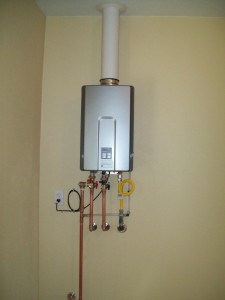 When your old hot water heater stops working, you will either need to repair or replace it. However, with hot water heater technology evolving at such a rapid rate, it can be hard to pinpoint which option is best for you. The information below discusses three of the most popular high tech hot water heaters to help you find the right balance between efficiency and performance for your particular home.
When your old hot water heater stops working, you will either need to repair or replace it. However, with hot water heater technology evolving at such a rapid rate, it can be hard to pinpoint which option is best for you. The information below discusses three of the most popular high tech hot water heaters to help you find the right balance between efficiency and performance for your particular home.
Tankless Hot Water Heater (see picture above left).
Like the name suggests, these water heaters do not contain a water storage tank. Instead of keeping 40 or 50 gallons of heated water in a reservoir 24 hours a day (which is a waste of energy and a drain on your utility bill) a tank-less unit heats the water as you need it.
Pros:
- Never run out of hot water
- Saves about 30-50% in energy costs, when compared to conventional gas heaters
- Takes up less space
Cons:
- Takes about 3-8 seconds to heat the water to the desired temperature
- Not easy to install
- Must be flushed with special chemicals every year to maintain energy efficiency and remove scale
Hybrid Electric Heat-pump Hot Water Heater
This type of hot water heater works by pulling heat out of the surrounding air and pumping it into the storage pump. It has conventional heating coils but, they only activate when the heat pump cannot sufficiently warm the water by itself.
Pros:
- Lowest operating cost of any electric water heater on the market, especially if you live in a warm climate and it is installed in your hot garage or attic
- Potential tax incentives and/or rebates (check with your state and electricity provider)
Cons:
- Costly price tag
- Takes up a lot of space
- Air filter must be cleaned on a regular basis to maintain operating efficiency
Condensing Gas Hot Water Heater
Instead of wasting energy by sending hot exhaust gases out of the flue, a condensing gas hot water heater blows them through the coil at the bottom of the fan to heat the water to the desired temperatures.
Pros:
- Most energy-efficient, gas powered water heater on the market
- High first hour recovery rate virtually guarantees that you’ll never run out of hot water
Cons
- Expensive price tag
- Require venting and gas line reconfiguration
Important Considerations
Regardless of the model that you choose, there are a couple of ratings that you must check before you buy your new heater:
- Energy factor (EF): Indicates how efficient the unit is; the higher the number the more efficient the heater.
- First hour recovery: This is for storage tank heaters and indicates the amount of hot water that you will get within the first hour after opening the spigot.
- Flow rate: This is for tank-less heaters, that use incoming winter water temperatures to provide the flow rate that you want.
Before you put down a ton of money for a new high tech hot water heater, it is important that you take some time to understand the pros and cons of each. To learn more about hot water heaters, see 5 Facts About Hot Water Heaters. The information above will help you narrow down your options so that you make the right investment for your needs. However, even though all the new models are more energy efficient, that doesn’t mean you’ll find them the most cost effective for your family. Plus, we are always ready to answer your questions and provide you with the facts you need to make an educated decision to meet your particular needs.


